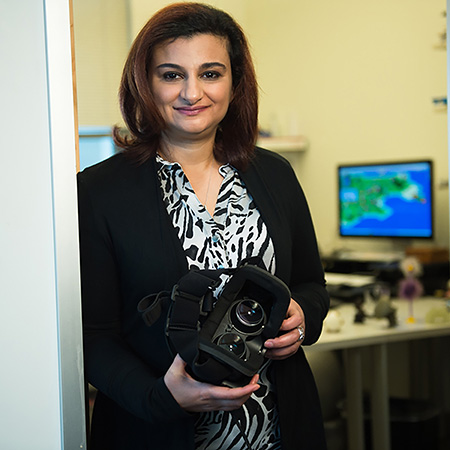Technology
Magy Seif El-Nasr appointed the UCSC Presidential Chair
Department Chair and Professor of Computational Media Magy Seif El-Nasr as the University’s next Presidential Chair to lead three initiatives related to AI and education.

UC Santa Cruz Chancellor Cynthia Larive has appointed Department Chair and Professor of Computational Media Magy Seif El-Nasr as the University’s next Presidential Chair.
The Presidential Chair is a three-year appointment awarded to a distinguished senate faculty member who is developing a new interdisciplinary academic program or expanding an existing one. Seif El-Nasr will push forward three initiatives relating to artificial intelligence and education, some of which are already underway. Her term begins July 1, 2024.
“I am thrilled to have Professor Seif El-Nasr as our next Presidential Chair,” Larive said. “Artificial intelligence has such wide-ranging potential impacts. Higher education, technology, business, art, science — AI touches the full range of human endeavors. These initiatives will help prepare our students to deal with AI creatively, ethically and in innovative ways in their time here on campus, and later in their careers.”
In her roles as a teacher, a faculty mentor, and an AI researcher in touch with industry and government, Seif El-Nasr is keenly aware of the evolving interests and needs in the AI field. For example, she currently teaches a course called Human-Centered AI (CMPH 80H), which has given her insight into student interest in understanding AI and how it will impact the job market, industry, academia, and beyond. Through her role as a faculty associate at the Teaching and Learning Center Faculty Fellow Program, she knows faculty are interested in learning more about how to address opportunities and limitations of AI tools in the classroom. These experiences have motivated and shaped the three initiatives she will lead as the Presidential Chair.
The first initiative, “AI Connector,” will host events that aim to enhance interdisciplinary collaboration for human-centered AI efforts across all five academic divisions.
The second initiative will conduct AI literacy workshops for UC Santa Cruz students, high school students, and faculty. These workshops will focus on increasing awareness of how AI works, encouraging critical thinking and self-reflection processes and skills around the use of AI tools, and, for faculty and instructors, understanding how to build and/or use AI tools safely in the classroom environment.
The third initiative will involve developing AI tools for education and enhanced learning in the classroom, exploring how tools like Chat GPT could be adapted to increase student self-efficacy and serve as tutors for topics such as research methods.
Seif El-Nasr directs the Game User Interaction and Intelligence (GUII) Lab, conducting and directing research that seeks to facilitate computational solutions to national problems in health, education, climate change, and security. Specifically, through her research, she and the members of her lab are building a framework to facilitate the use of virtual environments (e.g., games, VR, apps, social media, or interactive narrative) as a methodology to understand human behavior, cognition, and social cognition.
She has published seven books, close to 200 peer-reviewed articles and conference papers, and 10 peer-reviewed book chapters, and has received grants totaling approximately $13.8 million in her research career.
Seif El-Nasr will succeed Professor Astronomy and Astrophysics Natalie Batalha in the chair. During her appointment, effective July 1, 2021 to June 30, 2024, Batalha expanded the Astrobiology Initiative, a interdisciplinary collaboration in the pursuit of evidence of life beyond Earth.